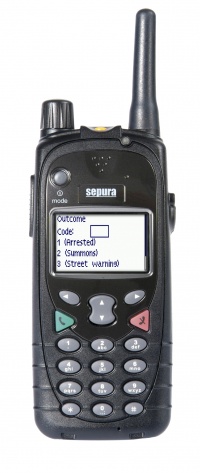A new era in Stop and Search
Greater Manchester Police (GMP) is successfully rolling-out Sepura’s bespoke Short Data Application (SDA) onto its network of TETRA radios.
Greater Manchester Police (GMP) is successfully rolling-out Sepura’s bespoke Short Data Application (SDA) onto its network of TETRA radios, enabling officers to electronically record data in their Stop and Search activity. In close co-operation with GMP and Northgate, Sepura developed the SDA to replace the manual entry of Stop and Search data, which will not only deliver reductions in time and money, but also improves the data quality, making it even more valuable for intelligence purposes.
The introduction of the 2010 Crime and Security Act—part of a process to safeguard civil liberties— requires all police officers Stopping and Searching members of the public to record key pieces of information: the reason for them having been stopped, the relevant law under which they were stopped and their ethnicity, together with time, date and officer identity details. In addition, GMP has also decided to capture the outcome of each Stop and Search encounter, recording if individuals are arrested, summonsed or given street warnings for their behaviour. Traditionally information recording involved a lot of paperwork - lengthening each encounter, putting officers safety more at risk - and this also resulted in many mistakes made either in capturing the data or, later, entering it into the central database.
The SDA is one of a growing number of Radio Applications which Sepura has developed to support users growing requirements for the transmission of data on their TETRA networks. The current portfolio includes WAP, SDAs and status-triggered functions.
Sepura explored the data collection capacity of both its radios and the established TETRA standard and found that the SDS (Short Data Service) capability within the radio was well-suited to the task, resulting in an SDA that fully met GMP’s requirements whilst minimising the need for officers to carry multiple pieces of hardware. 
Photo caption - Sepura’s rugged SRH3900 hand-held radio configured
with GMP’s bespoke SDA (Short Data Application)
The solution involved developing a series of menu-based prompts, which allowed GMP officers to record the details of any Stop & Search carried out, using their Sepura radio at the scene. Whilst the Sepura front-end solution provided the ideal response, GMP also needed to ensure integration with the back-end system, to ensure that the data was accurately recorded. Sepura worked closely with Northgate, the supplier of GMP’s back-office system, to integrate the data flows appropriately.
An operational officer involved in the six-month trial of the new technology commented: This system is by far the most efficient, simple to use, time-saving idea I have been involved in since joining the police nearly eight years ago.
John Buttress, Chief Inspector, Stop Search Project, Greater Manchester Police - Bolton Division, Feedback from the trial was extremely positive, the new system is easy to use, quick and efficient and helps to improves officer safety. Interestingly it also appears to have had a major effect on proportionality, reinforcing positive police/public relations.
Sepura is delighted to have helped contribute to safer policing for officers as well as saving money for GMP. When I transitioned from Police Service to Sepura I was keen to find opportunities where technology can really benefit the Police, and the stop and search SDA benefits the Police and public alike, says Jonathan Hamill, Regional Director at Sepura.
Following the success of the GMP trials, there are now a number of other police forces evaluating how the software could improve efficiencies on their networks.
Source: Sepura

